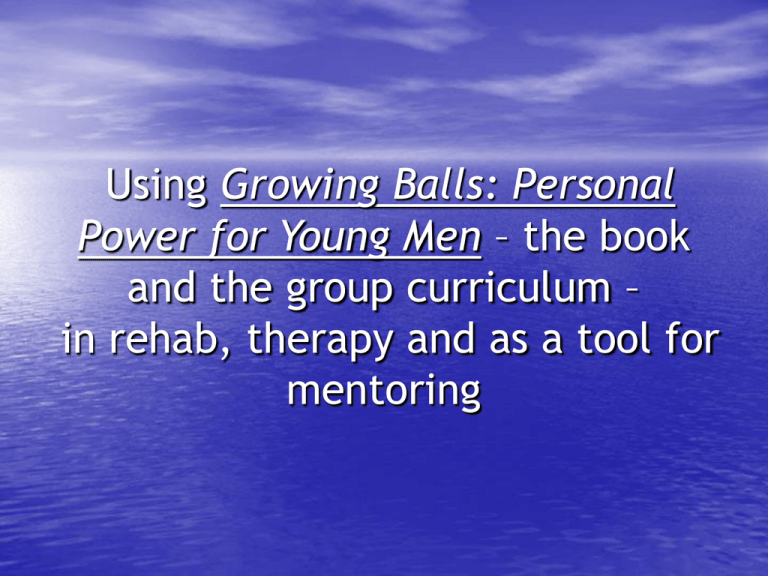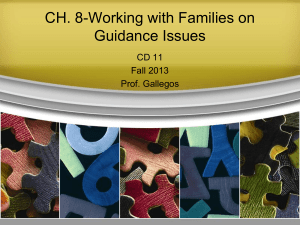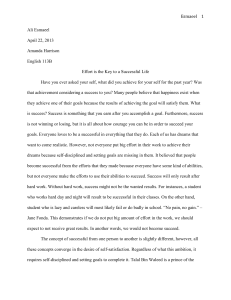GB Oakland conf Power Point
advertisement

Using Growing Balls: Personal Power for Young Men – the book and the group curriculum – in rehab, therapy and as a tool for mentoring Professional Bio of Your Intrepid Presenter for the day: David Hafter, MFT -Author of the charmingly titled primer: Growing Balls: Personal Power for Young Men Licensed MFT for 20 yrs; BBS Subject Matter Expert for 15 yrs; Orals Examiner for 4 years Private Practice; Residential Tx (for both wealthiest and most impoverished kids in America); In-Home/community based services, including WRAPAROUND Areas of expertise: Individual and Couple’s Therapy (including fertility issues) , Family Therapy, Men’s issues, Substance Abuse Treatment Why write Growing Balls? • After 20 plus years of providing treatment for young men as an MFT (and often far too late), GB is my attempt at prevention. • Most young men are more in need of mentoring than therapy. • As a therapist, I don’t get to tell clients what to do and what not to do; as a writer, I can (and do). Why else? • Frustrating issues that drove me to write: – – Kids having kids Fatherless/mentor-less boys making bad choices for them and expensive ones for the rest us – Poor state of marriages and families – Domestic Violence (empty man syndrome) – Drug/alcohol problems – Lack of societal emphasis on mentoring, skill building and developing Rites of Passage Current approaches to these issues are not working. Issues our kids are facing growing up today: • The need to belong • Child to adult transition issues • Individuation • Peer Pressure • Sexual issues • Drug/Alcohol issues • Gangs • Both parents working/supervision issues • Bizarre “MTV” role models and values Group Exercise – Think back to your teen years. Remember a time when you: Struggled with family issues Struggled with sexuality issues Struggled with peer pressure Struggled with drug alcohol decisions Struggled with relationship problems Struggled with a poor self image Just plain struggled? With all that going on… Who was there for you? Besides therapy, our kids need healthy mentoring. GB is 175 pages of mentoring • Author’s voice is to young men, not about them. However, • the book was written with single mothers raising sons alone in mind, • And for the girlfriends/wives who want to understand the young men in their lives. The title may make some of you cringe, but the guys love it… In our business, everyone pretty much agrees that the most important change element is the relationship between clinician and client. The title, chapter headings and sometimes coarse language help establish the relationship. We are attempting to connect with Young Men through a medium few (if any) of them use – Pop psych/self-help books. The “Balls” Metaphor Popular lexicon for using balls is nerve or chutzpah as in doing or saying something crazy or outrageous… Growing Balls uses the term balls for having courage and integrity. What kind of role modeling would it be for me to make nice with the title (to make adults feel better) so I can sell more books? How many other self help books are written to and for young men? Essentially, we don’t have the time to worry about making people feel comfortable, making nice and being Politically Correct. So, where do we begin? GB begins with an assertion: “If you are twenty-five or under, you have no business even thinking about getting married or becoming a father.” This sets the stage for discussing maturity, moral development and intelligent decision making. The Crash Course • Ten pages summarizing the rest of the book, focusing on relationships with girls/women, the place where most guys are focused. • If the guy likes the first ten pages, he will read the rest of the book; or his girlfriend will… Topics covered in GB include chapters on: • The courage to find your values • Conscious compromising in relationships • Relationships with women • • • • • – – – – Why women love jerks – Finally, an answer! Being “In Love” The Intimacy Question Worthwhile Women Sexuality Getting Loaded (getting high is a natural desire) Maturity (immaturity is not a cause for shame) Friendship (being willing to tell your friend the truth) Fun Tests: Knowing that you are ready to – Be a husband – Be a father Initial concerns and reservations… In therapy, this is not the best approach for all clients… • Squeamishness (the clinician’s or the family’s) • Political Correctness • Religious concerns – Topics include positive takes on masturbation & birth control – Bottom line: you don’t have to endorse everything in GB to use it. What is important is for the topics to be discussed… Using GB with teens in therapy • First of all, determine need and usefulness given the client’s issues. – If s/he is dealing with GB issues (think back to our exercise) and can make use of the material, explain to the client’s parents/caregivers the GB approach, the meaning of the balls metaphor and if their heads do not explode, get their permission to use the book in therapy. Or, if that won’t work, use only the Personal Power for Young Men group curriculum. • The group material is easily modified for individual work and can be billed as therapy or rehab and encapsulates most of the values areas of the book. One Chapter a Week • In 1 to 1 counseling: – acknowledge that the book is “aimed at guys a little older than you are” but you think they are ready to tackle the topics. • Focus on discussion of the content issues, not • • adherence to writer’s opinion. Search out and encourage linkage to other sources of healthy mentoring In Family Counseling • GB is at its best in starting conversations on sometimes difficult and uncomfortable topics. – Agree or disagree with the ideas or premises – just talk about them with kids. – Some parents discuss the book, chapter by chapter, with their teens (boys and girls). You can facilitate discussions between kids and parents/caregivers on GB topics, with you focusing your attention on their process. Or, as the perfect stocking stuffer… • I’m only partially kidding and not just to sell books. – GB gives parents (or others caring for/ mentoring young men) a format for addressing sensitive topics. It breaks the ice and opens doors for important discussions – A copy tossed into a young man’s room, without explanation, can achieve good results. Personal Power for Young Men A (free) group counseling curriculum • A flexible curriculum designed for a 9 week group • Can be run by professionals or nonprofessionals • Can be used in a variety of settings • Can be modified for boys 13 and up. Skipping potential drama Using the subtitle of the book for the group name – Personal Power for Young Men - gives the material wider access to traditional settings where the GB moniker might make waves. PPYM groups are being done in schools, at Transitional Aged Youth (TAY) programs. Outpatient clinics and residential treatment programs. Focusing on the Future • The group curriculum is set up to help guys form a picture their desired future and then help them see what it will take to get there. • PPYM helps them to develop their Personal Power, which is their ability to live their lives according to their values and desires. The Personal Power for Young Men Group • PPYM Group is designed to help young men to indentify what gives or takes away from their personal power. • Personal Power is defined as a man’s ability to live life the way he wants to live it with underlying values of being safe, healthy and out of trouble. The Group Process • Go through normal rules of group process, • including limits of and expectations of confidentiality (illustrate with the use of practical examples), no put downs and expectations that everybody participate. “We’re just guys here.” (Or, with a female facilitator, “You can be just guys here.” – In other words, swearing is okay and honesty is encouraged. Week 1 Personal Power Comes To You When: • • • • • • • • You come to know and like yourself You live by your own set of values You exercise self-discipline and accountability You take care of your mind and body You show patience with yourself and others You listen to others with more experience than you have You take (reasonable) chances and risk making mistakes You appreciate your life and respect the lives of others • You forget your own values as a person • You act against your own set of values • You act out weakness • You act impulsively • You abuse substances that affect your mind and body • You ignore people who try to help or teach you • You shrink away from new challenges • You risk your life or the lives of others with your actions The Lightning Round • Each guy makes his list of answers on the board. – Then, take turns going through each list. – Have each group member ask a quick question of the boy who wrote the list. The question should be related to answers given on the list. • This increases group interaction and helps the guys to get to know one another better. The Right Choices The Wrong Choices Week 4 Personal Power Comes To You When: • • • • • • • • You come to know and like yourself You live by your own set of values You exercise self-discipline and accountability You take care of your mind and body You show patience with yourself and others You listen to others with more experience than you have You take (reasonable) chances and risk making mistakes You appreciate your life and respect the lives of others Exercising Self-Discipline • What does the phrase “self-discipline” mean to you? • What does it mean to be accountable for you actions? • Tell the group one instance in which you exercised self-discipline. – How did it make you feel? What could have gotten in the way of you exercising self-discipline? • Accountability means taking responsibility for your contributions to your problems. – Tell of a time when you got into trouble for something you did. What was your fault and what was not? • How do you develop self-discipline? Activity: What does it cost to be a good father? If you want to do the job right, you have to provide for your family. 1) Make a list of every cost you can think of associated with having a baby, from the hospital on… Guess at dollar amounts and duration of expenses. 2) List every change of lifestyle you would experience: a. How you use your free time b. What you do for fun c. How you spend your what’s left of your money And just know that… Any experienced mother would laugh her head off at our lists because of all the stuff we forgot to mention regarding our money and time commitments… Final Question • What does exercising self-discipline have to do with Personal Power? Fidelity to Concepts; Flexibility in Delivery • The curriculum is designed for each group to have: – A specific topic – Questions that prompt discussions – An activity Know that you are free to use your own questions or make up your own activities. The Curriculum is Free • Go to www.growingballs.com (what else?) • There, you can read snippets from each chapter of the book, order copies and best of all: • Download the curriculum! There are instructions for the facilitator, a certificate of completion and power-points you can use (though not necessary) All I ask… • Is that you use the free pre and post test also on the website and that you send me the results so I can see how it is working Questions on using the GB book or PPYM group material? • Thank-you for your time • Thank-you for being open-minded • Thank-you for not throwing anything at me… • Please fill out your Presentation Evaluation forms • Remember to visit www.growingballs.com and check out the Growing Balls song on Youtube. (type in Growing Balls or my name in the Youtube search engine)









